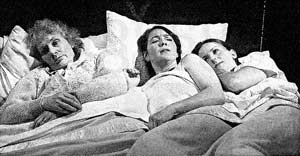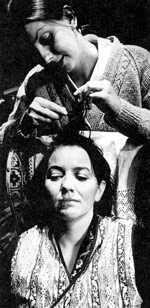|
Loading
|
|
|
Reviews of The Sleepers' Den at the Southwark Playhouse
 London
Evening Standard, 2 July 2001
London
Evening Standard, 2 July 2001
Den of despair
PETER GILL'S closely observed, claustrophobic The Sleepers' Den first appeared at the Royal Court in 1965, boasting Eileen Atkins in its leading role. More than 36 years on, this depiction of life in a Welsh cottage shows no sign of dusty irrelevance: on the contrary, it is painfully alive with the plight of a woman who masks the crumbling edifice of her self-confidence with a rigid-as-ice determination.
Gill is a champion of D H Lawrence's far-too-seldom produced dramatic works, so it is unsurprising that this play carries strong echoes of The Daughter-in-Law performed to great critical acclaim at the Orange Tree earlier this year, and which Gill directed at the Royal Court. Where, however, Lawrence's women pull all the strings and control the cottage-bound tensions, here you can see that not only are the strings animating Mrs Shannon's existence they are beginning to throttle her.
The versatility of Southwark Playhouse is shown once more in Rachel Blues's design. She evokes the Shannons' paralysing poverty with a set dominated by a huge old double bed that shrinks the room where the family plays out most of its limited existence. Three generations live in this house: Old Mrs Shannon, who is confined to the bed, Mrs Shannon and her daughter Maria. Frank, Mrs Shannon's brother, lives there, too, but he turns up only to demand food: otherwise, visitors are restricted to the rent man and a nervily do-gooding Catholic girl.
It seems hard to believe that it was only a year ago that Thea Sharrock won the James Menzies-Kitchin Award for young directors. In this tale of a woman's disintegration the first play she has directed since taking over as the Southwark Playhouse's artistic director she demonstrates an impressive assurance: not a single false emotional note is struck in the entire evening. There are moments when it feels that the a line between illusion and reality has been I so successfully dissolved that we become like flies on the cottage wall.
As Mrs Shannon, Maria Pride is breathtakingly superb in a play where little happens, yet an emotional epic is evoked.
Rachel Halliburton
The Guardian, 13 July 2001
The news that Southwark Playhouse is currently offering abuse of the elderly, the illegal use of prescription drugs, child neglect, mental disintegration and three women in bed together may well have aficionados of in-yer-face theatre flocking to get in. In fact, this revival of Peter Gill's 1965 study of despair and breakdown in a poor Cardiff family is a reminder that depictions of ordinary family life, with all their quiet cruelty, can be just as shocking as bottles up the bum.
Gill's play is a naturalistic bomb, a miniature molotov cocktail that goes about its business with such quiet understatement that you don't at first notice its impact. It doesn't so much tell a story as simply observe life in the Shannon family, Irish Catholics settled for a century in Cardiff and still not making a go of it.
Rachel Blue's detailed set conjures up life in a back-to-back dominated by the bed where old Mrs Shannon, not yet 60 but already ancient, dreams away her life in a semi-comatose state because of the sleeping pills administered by her daughter, Joan. Joan's own life has closed down to a single room wallpapered with hopelessness.
Alternating between rage at her mother and affection, Joan just can't cope and her moods have a knock-on effect on the rest of the family: her young daughter Maria and her brother Frank, a docker who has the freedom of a man to engage - or not - with the family and its problems.
This is not an easy play to direct, not least because Gill was very much the novice when he wrote it. Southwark's new artistic director, Thea Sharrock, gets the measure of it, bringing the mixture of intelligence, precision and an ability to hold back and use stillness that is becoming a hallmark of her work.
At a preview performance neither Sharrock nor the actress playing Joan had quite conquered the structural and emotional mountain that is the play's final 20 minutes. When they crack it this will be an intense and intimate experience. Not fashionable, but quietly and horribly fascinating.
Lyn Gardner
Sunday Times, 8 July 2001
The veteran director Peter Gill has always had another life as a writer. His first play, produced at the Royal Court in 1969, marked out his chosen territory. A dark, intense family drama set in an impoverished Cardiff back-to-back, it reflects the Royal Court realism of the time. Grandmother Shannon is bedridden and semi-senile.
Her daughter is an unmarried mother driven to despair; her brother labours on the docks. This almost parodic situation is saved by the niceties of Gill's observation, and the near-poetry he wrings from the squalor: for instance, the delicate flirtation over a cigarette between the brother (Paul Wyett) and a visiting spinster (Helen Anderson).
This fine revival is directed by Thea Sharrock. Essential in a period piece, the actors all astonishingly look the part.
Robert Hewison
The Times, 2 July 2001
IN PETER GILL'S first play, written towards the end of the Sixties and set in a terrace house of his native Cardiff, we watch a still youngish woman being allowed to slide into the dark pit of depression. The flyer for the play uses a picture of women on their knees scrubbing doorsteps, but Joan Shannon has already passed the point of keeping up such appearances. She has a seemingly bedridden mother whom she alternately threatens and cossets; a quiet daughter wanders in and out clutching a comic; the man of the house is a brother who works in the docks. We learn nothing about the daughter's father.
A debt-collector calls, insistent but far from being a villain, and the nervous visitor from the Legion of Mary would like to help if she knew how to chip through Joan's implacable pretence that all is well.
You might feel that nothing could be more depressing than to watch Joan's decline, but no, it is utterly engrossing. Gill's precisely judged dialogue, creating puzzles even as it reveals the characters, draws us into Joan's awkward world, where happiness is a cup of tea she once bought on a train.
Is too little explained? Gill isn't into explanations. This is how a particular life is being experienced, and we come to experience something of it. There is a quietly revealing moment when Maria Pride's Joan, greasy-haired, round-faced, strangely contained, subsides into a chair. At last her features are able to release their tension but then she remembers she must make her mother a cup of tea and the time for relaxation has gone.
Central to Joan's predicament must be her mother (Cynthia Grenville). We never learn why she has taken to her bed she is only 58 but the expression on her face shows that she fears her daughter's power. And yet one scene ends with all three generations of women in the double bed together, warming each other with their proximity, in an image of family bliss.
Thea Sharrock, artistic director of the Playhouse, worked with Gill on his recent production of Speed-the-Plow, and her direction here is marvellously sensitive to the steady pace of his writing and the significance to be found in minute glances and gestures. The characters hear what is said to them but respond in a manner we can consider insufficient yet which feels to be at the limit of what is possible.
In the only scene where Joan is out of the room her brother (Paul Wyett) and Helen Anderson's flummoxed visitor awkwardly reveal a fraction of their anxieties, and one senses that such confessions occur painfully seldom in a society far from being the supportive community of working-class mythology. Even if people care about distress they don't know how to relieve it. It is a bleak world but one that is beautifully realised in writing, direction and performance.
Jeremy Kingston
 "You
don't know what you're missing." That's from The Sleeper's Den, and if you
don't know it, well you... Actually, on this occasion you're excused if you don't
know, as it is shockingly rarely performed, like all of Peter Gill's plays. Alongside
the similarly detailed, strong and subtle Robert Holman, Gill is one of the most
under-rated writers in Britain.
"You
don't know what you're missing." That's from The Sleeper's Den, and if you
don't know it, well you... Actually, on this occasion you're excused if you don't
know, as it is shockingly rarely performed, like all of Peter Gill's plays. Alongside
the similarly detailed, strong and subtle Robert Holman, Gill is one of the most
under-rated writers in Britain.
All that may change next spring. Michael Grandage has programmed five Gill plays at the Sheffield Crucible; from Kick for Touch, directed by rising talent Josie Rourke, to Original Sin a new version of Lulu directed by Gill himself. He's such a strong director that he made David Mamet's wobbly Speed-The-Plow look first-rate. His assistant on that production was Thea Sharrock, who is returning the compliment by reviving his first play The Sleeper's Den.
At the first performance at the Royal Court in 1966 Gill panicked and hid in the costume department but he needn't have. Not only is the writing fuelled by compassion, it was immediately clear that he knew the difference between showy emotionalism and true passion.
David Benedict
Time Out
 From
its sparkling new tube to its proliferation of posh warehouse conversions, Southwark's
working-class past is rapidly being tidied up, glossed and appropriated by the sprawl
of gentrification. So too are the Cardiff docks of Peter Gill's first play, and
the combination of dilapidation and development that still hangs over the Southwark
Playhouse makes it a potent venue for this reverent revival of Gill's heartbreaking
tale.
From
its sparkling new tube to its proliferation of posh warehouse conversions, Southwark's
working-class past is rapidly being tidied up, glossed and appropriated by the sprawl
of gentrification. So too are the Cardiff docks of Peter Gill's first play, and
the combination of dilapidation and development that still hangs over the Southwark
Playhouse makes it a potent venue for this reverent revival of Gill's heartbreaking
tale.
Between the rock of charity and the hard, lonely place of debt, the Shannon family struggle to keep their dignity and sanity in their condemned home. The task falls to Joan, who alternately tries to brighten the drab lives of her bedridden mother and her tight-lipped daughter and to destroy her relationship with both of them. Her wayward brother, Frankie, is a docker whose meagre pay does little to alleviate Joan's sufferings, and who increasingly seeks consolation in the pub. Into this knot of familial frustration, the debt collector and a church worker arrive and push the tension to breaking point.
Director Thea Sharrock paces and plots the action beautifully and, with some understated set and lighting design from Rachel Blues and David Holmes, she creates some stunning, achingly convincing pockets of drama. Her task is aided immeasurably by the performance of Maria Pride as Joan, though the rest of the cast have a hard time matching her pitch of intensity. Both Gill's script and Sharrock's direction seem disappointing in the second half of the play, where a pall of misery smothers the brittle dialogue and bleaches the humanity from these fallible characters. But for the first hour of the evening, it would be difficult to imagine a more affecting, insightful portrait of agonising domestic paralysis than the one Sharrock paints on the Playhouse stage.
Lucy Powell
London Evening Standard, 28 June 2001
Passing on PG tips
 She
is only 25 but she's already had her big break, directing Caryl Churchill's Top
Girls last summer at Battersea Arts Centre, followed swiftly by the chance to direct
the long-running hit Art. She's won an award for young directors and turns up in
those lists of hot young hopefuls to watch. Now she is the youngest artistic director
in the country, at Southwark Playhouse, where she was appointed in January. The
first play she has directed there herself opens next week.
She
is only 25 but she's already had her big break, directing Caryl Churchill's Top
Girls last summer at Battersea Arts Centre, followed swiftly by the chance to direct
the long-running hit Art. She's won an award for young directors and turns up in
those lists of hot young hopefuls to watch. Now she is the youngest artistic director
in the country, at Southwark Playhouse, where she was appointed in January. The
first play she has directed there herself opens next week.
Phew. If the rise and rise of one so young is a dizzying prospect, pause to note that one of her best moves was to approach a man 40 years her senior, the distinguished director and playwright Peter Gill, founder director of the Riverside Studios and the National Theatre Studio.
In 1999, Gill was to direct David Mamet's Speed the Plow in the West End, starring Mark Strong, an actor Sharrock admires hugely, and Patrick Marber in his stage debut. She offered her services, gratis, as an assistant director.
"I nearly fell off my chair when he phoned me up and suggested we meet," she recalls. "She was bright, very clued up about things relevant to that production," he says. A colleague recommended her and he noted that she had been a member of Anna Scher Children's Theatre for 10 years, then worked at both the NT Studio and the Market Theatre in Johannesburg in her gap year between St Paul's and Oxford.
Although she was president of the university dramatic society, she left a year early, eager to move on. All this helped convince him that she was not just another Oxbridge-only wannabe. He took her on. "Thea was very, very good at helping being there with you, talking things through, being one step ahead, making a good relationship with the actors," he says.
Sharrock found him to be a brilliant teacher and a very generous director.
"He said to me very early on, 'Casting is all 80 per cent of the work is done if you get that right', and, by God, was he right. The most important thing I learnt in rehearsals was to admit that you don't always have instant answers to everything. That honesty is more important than pretending. Actors love working with him because he really cares about the people and the process.
"We are both interested in the details that say a lot about a person, and he is brilliant at piecing people together. He is not interested in spectacle, in making a big splash; he is interested in quality work." She also admires him for sticking to his guns. "He is not interested in the bullshit and I think that's wonderful."
He has made her unafraid to ask the most basic questions, she says, citing this as the main reason they have become friends. When the post at Southwark of which Gill is coincidentally a patron became available, it was to him she turned for advice. When it came to choosing a programme for the Playhouse, she realised, however, that she had never read any of his work. "I went to the NT bookshop and bought everything they had by him and I thought she takes a sharp intake of breath 'This is so me.'"
So next week will see a double-first: Sharrock's debut production will be Gill's earliest play, written when he was the same age as she is now. The Sleepers Den, set in the writer's native Cardiff, is a study of poverty in the 1950s, centred on a few days in the life of three generations of one family. "It just felt right," says Sharrock. "Nothing much happens in Sleepers Den but the first time you read it you know these characters exist. It doesn't seem dated, because the writing is so good, given that he was so young when he wrote it. The strength of all his plays is the dialogue."
Gill comments that it is a sign of Sharrock's boldness that she has chosen it. "It's a different kind of calling card. There are not many young artistic directors who would schedule it at the moment." Although she has spoken to him on a daily basis about the play during rehearsals, she is more nervous at the thought of him in the audience than of anyone else. He expects the production to be, like its director, very fresh.
After Sleepers Den, Sharrock's plans for Southwark include both brand new and traditional plays a modern version of Chaucer's Wife of Bath, for example, alongside Shakespeare. Gill believes she is lucky. "Southwark is one of the most pleasant fringe venues", he says. "There is only one thing young directors have to do and that is direct. It's a tough training, she has a very limited amount of money and a small space, but she's where she ought to be at this minute."
Her contract is for two years. When it comes to her next move, she will no doubt seek Gill's opinion. "If somebody asked me to do something for which I'd get an enormous amount of money but I knew it was absolute rubbish, and I rang him and asked what I should do, he'd say, 'Well, darling, you know really, don't you?'"
Hilly Janes